This is the old courthouse in Centreville, Michigan, the seat of St. Joseph County. I often use this area, or the sandwich shop across the street, as a place to take a break on my rides through the county.
Kitty-corner across the street, to the northwest, is the location of the very first courthouse, so to speak. It was a multi-purpose building, and was the scene of the court where a judgment against Patrick Marantette had been appealed back in the early 1830s. On the order of territorial Governor George Porter, Marantette had destroyed the whiskey kegs of a farmer who had come on the nearby Nottawasepe reservation during treaty payment negotiations. The farmer had been trying to sell whiskey to the Indians, which was illegal for him to do at that time and place. The farmer then sued Marantette for the destruction of his property. The case dragged on for a few years before a final judgment was rendered against Marantette.
I’ve blogged about it in these two articles (here and here) over at The Spokesrider.
I think about it in connection with the dispute between George Bush and congress over whether telecom companies should be made immune to lawsuits over their actions in assisting the Bush administration with its wiretaps. My own choice of where to draw the line between legal and illegal wiretapping would probably be somewhere between the Bush’s ideas and those of his moonbat opponents.
Well, I don’t for one minute believe the leftwing moonbats are opposed to his wiretaps. What they’re opposed to is George Bush. They have some very good arguments on their side, but as we’ve seen in the past, they’ll throw them out once their own person is in the Oval Office.
Wherever the line is drawn, I don’t think we should be comfortable with the idea of giving the telecom companies a free pass. In a society that relies on checks and balances, not only between branches of government but among private institutions as well, we need the telecom companies to think long and hard before deciding that the government is asking them to do the right thing. They should not be allowed to switch their brains and moral compasses off just because they’re doing what the administration tells them to do.
We don’t allow soldiers to blindly follow orders to commit atrocities. Why should we allow the telecoms to do so?
What does this have to do with Marantette? Not that the outcome was just, but I had thought his case was an old example of where a private citizen was NOT given immunity for work he did against another citizen at the request of government. Well, the journal kept by the court tells us that a judgment of a little over a hundred dollars in damages and court costs was assessed against Marantette in the end. But just a couple of days ago I stumbled upon information in the archives showing that the U.S. Commissioner for Indian Affairs in Detroit had paid the $300 fee for the lawyer who defended the suit against Marantette.
Not that it argues one way or another in the case of George Bush’s wiretaps, but just the same I like knowing the historical precedents for things like this.
